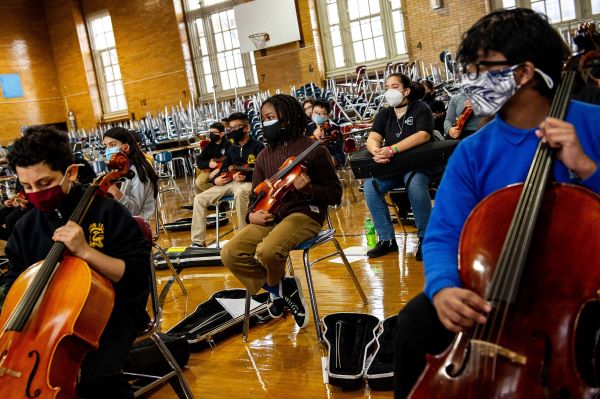
Music class (photo: @ETMonline)
Two weeks before schools closed last March, our team at the New York City nonprofit Education Through Music brainstormed ways to provide music lessons online so that students wouldn’t miss a beat. At the time, we didn’t imagine we would be teaching virtually for an entire year. We’ve now hit the one-year mark of online learning, and while the past year has been filled with seemingly insurmountable obstacles, the education sector has risen to the challenge.
Yet many difficulties remain. Our students have faced the trauma of isolation, fear and, in many cases, grief. Racial inequity remains widespread. And although music programs are vital to a well rounded education, over half of New York City public schools don’t have a full-time music educator on staff. Giving students access to music education is core to my nonprofit’s mission and vital to facing these continuing chall enges.
New York City Schools Chancellor Meisha Porter wants to prioritize learning from the lessons of the past year, including continuing to use digital tools. We also need to bring a new mindset going forward. There are three crucial principles we as a city and as education professionals must carry forward from the past year as we rebuild a more just system that serves all students.
Collaboration
To adapt as circumstances change, education organizations must collaborate effectively across teachers, administration, nonprofits, and the Department of Education. When possible, we should also build partnerships beyond educational organizations. We know working with other educators and partners enables us to achieve goals greater than individual organizations can reach separately. Going beyond sector-based partnerships multiplies our potential impact even further.
For example, by collaborating with BronxNet and WNET to provide on-demand lessons via TV, we were able to reach more students than ever, including those who can’t access music education elsewhere. Who else can we work with? Who is speaking to the students we struggle to reach? How can they help us? Educators must continually ask ourselves these questions as we rebuild better systems in the coming years.
Inclusion
The past year has made the public aware of the vast inequities still present in our country and education system. To rebuild in 2021 and beyond, we must foster inclusion in the classroom, schools administration, and through policy decisions, including financial commitments, across the city and state. Studies have shown that diversity in schools is beneficial to students, who are able to learn from one another and broaden their understanding of different cultures. This is equally true of lesson content and we must all push ourselves and our organizations to do more to include diverse perspectives and voices into our curriculum.
The National Association for Music Education explains that including all forms and types of music within the classroom allows students to explore and expand their communication, collaboration, and music literacy skills in a variety of formats, structures, and ensembles. To that end, Education Through Music has reviewed its music repertoire of roughly 2,000 pieces of music to ensure it is diverse and inclusive, and will be taught with cultural contexts, enabling us to share the rich diversity of music with our students. At the same time, we developed social justice resources and training for teachers. And we can do more by connecting music educators to the school community and providing opportunities for parents and the community to participate.
Drive
To promote a system where all voices are celebrated and empowered, we must have high aspirations, day-to-day flexibility, effective partners and a focus on the goal of inclusion. Challenges will always exist, and must not distract us from the bigger picture. In that spirit, Education Through Music launched its first high school music class this year despite the pandemic. As an almost-thirty-year-old organization, this has been a goal for a long time, and the pandemic threatened to jeopardize HS 223 students’ opportunity to experience music class as high schoolers. All parts of the education system must keep that focus on the next place for improvement at all times, even when facing monumental challenges.
Looking forward, I have hope that our students and staff can return to a sense of normalcy, and our teachers can have the in-person engagement with students that our educators crave. I am excited to see our students enjoy the live performance opportunities they’ve missed for more than a year. And I anticipate returning to a kinder society that supports an equitable and inclusive education, and recognizes children’s social and emotional needs.
***
Penny Swift is the Executive Director of Education Through Music. She is a lifelong advocate for equality and excellence in education, a former special education teacher, and a proud alumna of New York City’s public schools. On Twitter @ETMonline.
***
Have an op-ed idea or submission for Gotham Gazette? Email This email address is being protected from spambots. You need JavaScript enabled to view it.




